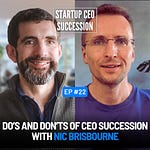Rory Stirling is a partner at Connect Ventures, a product-focused investment firm headquartered in London and investing across Europe. Connect invests in opinionated products, crafted with love and loved by many.
I stole this bit — “crafted with love and loved by many” — from their website. I love how well it communicates what they’re doing: looking for teams with a specific, idiosyncratic angle on what they’re doing that deeply resonates with many others. Not simply “built with skill and used by many” but “crafted with love and loved by many”.
Rory is one of the few investors I’d trust to fire me if I were in his portfolio as a CEO. I know he’d approach the conversation with the the necessary self-awareness and clarity, not shying away from the difficulty of the conversation or his own feelings.
Discussing stepping down during fundraising
Many investors would be spooked by a founder raising a possibility of stepping down at the fundraising stage, but Rory sees it as a sign of maturity.
There’s an important nuance here. A sign of maturity is recognising that if the founder is truly successful is building a fast-growing company, it might outgrow them and then the best thing might be to step down. That’s very different from planning to step down half a year after Series A when much of the work is still ahead of the business.
As Rory and I discuss, the most critical factor in navigating a potentially difficult conversation for both founders and investors is building trust beforehand. Founders are understandably afraid that if they open this door, they won’t be able to row back from discussing their leaving.
Investors are often worried about losing a founder CEO who’s critical at the early stage and concerned about their own image. After all, they’ll have to go back to their colleagues and explain why the founder they backed is now moving on.
Founder guilt
One particular point we touch on is founder guilt. Entrepreneurs often feel guilty about letting down their investors if they choose to leave before the business delivered its returns. Yet, Rory doesn’t see it this way. First, you don’t make money in VC without losing money:
Ultimately, we are in the business of venture capital, of taking a lot of risk. And we do that willingly, like, every single time. So, or said in a more blunt way, we can't make money without losing money. Like, it's just an… it's impossible in our industry.
Second, the right thing is to do the right thing, whether it’s staying or leaving. Staying as CEO isn’t right if it becomes counterproductive to company success.
Getting own house in order
Rory is also one of the few investors who’s willing to openly acknowledge that the investment community sometimes needs to do their own work:
because ultimately we're human and everything's driven by fear and greed.
I think many founders and investors would like to think that success in the VC game is all about making good rational decisions and being smarter than the next person. In reality, keeping the fear and greed in check on both sides of the table is what helps everyone navigate difficult conversations.
How does Rory do it? By asking himself what could be an uncomfortable question for many investors before having a difficult conversation with a founder:
I'd like to think as an investor, and as a board member, and as a partner to the founder that I'd earned the right to have that conversation [about stepping down] openly with them.
Parting advice
Here are four key pieces of advice Rory shared in this episode:
These things [CEO succession] are typically not as scary and they are way more practical once you've said them out loud.
All investors, my advice is we need to get our own house in order. We need to not operate from a place of fear and greed. We need to operate from a place of strong foundations and security around a board table.
I think the worst outcome is when someone stays in a role for longer than they should, whether that's because they've felt loyalty to investors or, you know, different stakeholders in the company, or whether they feel shame from leaving the company.
We've got to assume at least six months, but probably 12 months for this process [CEO succession] to fully run its course.
Enjoy listening to the platform of your choice: here on Substack or on YouTube, Spotify or Apple Podcasts.










